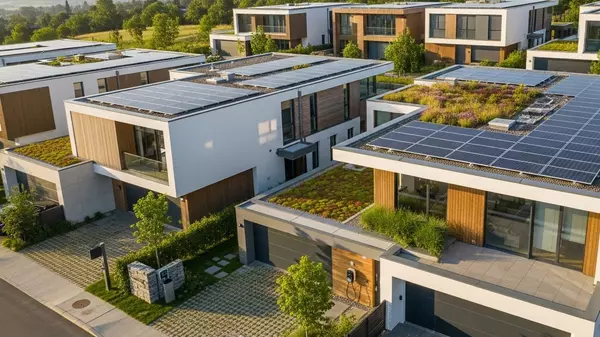How Economic Policies in 2025 Will Fuel Sustained Growth in the Real Estate Market

As we look ahead to 2025, economic policies are poised to play a pivotal role in shaping the future of the real estate market. A combination of fiscal measures, strategic investments, and targeted reforms will likely create a conducive environment for real estate growth—one that is sustainable for years to come. Here’s how upcoming economic policies will boost the housing market and the broader real estate sector.
1. Continued Low Interest Rates
Central banks globally, especially the Federal Reserve in the U.S., are expected to maintain low interest rates through 2025 to combat lingering economic uncertainties and promote investment. While rates may fluctuate, they are expected to stay within a range that encourages both homebuyers and investors. Lower mortgage rates allow more people to enter the housing market, making homeownership more accessible, which drives demand across residential real estate. As more buyers are able to afford homes, I believe that this will contribute to steady price appreciation, benefiting both sellers and the broader economy.
2. Increased Investment in Infrastructure
The U.S. government and many other nations have committed to ambitious infrastructure plans, which will become more pronounced in 2025. This includes investments in transportation, energy, and digital infrastructure. Improved roads, transit systems, and smart city technologies not only enhance the quality of life for residents but also boost the attractiveness of real estate in these areas. Locations that were previously underserved will experience revitalization, opening up opportunities for property development, residential sales, and commercial growth.
For my real estate investor clients, this is a key signal for areas that will see enhanced property value over time. Cities with better infrastructure attract new businesses, increase demand for both residential and commercial spaces, and create long-term growth prospects.
3. Affordable Housing Initiatives
In response to rising housing costs and affordability issues, economic policies in 2025 will focus on the expansion of affordable housing programs. These may include tax incentives for developers to build affordable units, increased funding for public housing, and subsidies for low-income renters and homebuyers. By making housing more affordable, the government will ensure that demand for housing remains strong across all income levels. This policy shift is particularly important as younger generations are entering the housing market, and they need affordable options in addition to higher-end properties.
As more people have access to affordable homes, it will reduce the number of people living in overcrowded or substandard conditions, improving the overall quality of life and maintaining a positive outlook for real estate developers and investors.
4. Tax Incentives for Green Building
Sustainability is becoming a core focus of global economic policies. By 2025, the government is expected to implement more robust tax incentives and credits for green building projects. These policies will encourage the development of energy-efficient homes and commercial spaces that minimize environmental impact. Buyers and investors will increasingly demand properties that offer long-term savings on energy costs, reduced environmental footprints, and higher standards of living.
This will lead to a boom in eco-friendly real estate development, and municipalities that encourage green building standards will see rising property values. Over time, these policies will drive innovation in construction and energy technologies, ensuring that the real estate market is aligned with broader environmental goals.
5. Incentives for First-Time Homebuyers
To further boost the housing market, economic policies in 2025 will likely focus on helping first-time homebuyers enter the market. These policies may include down payment assistance programs, subsidized mortgage rates, and expanded access to government-backed loan programs like FHA and VA loans. As the millennial and Gen Z generations mature and start families, their demand for homes will be critical to sustaining the housing market.
Government support will make it easier for these new buyers to enter the market, which will not only benefit the residential sector but also spur related industries like furniture, home goods, and home improvement. These first-time buyers will also contribute to a more dynamic real estate market, as they move up the property ladder in the years to come.
6. Real Estate Technology Integration
Advancements in technology will play a significant role in the real estate market of 2025 and beyond. With the adoption of AI, virtual reality, blockchain, and other innovations, the buying, selling, and management of properties will become faster, more efficient, and more transparent. Policies encouraging the integration of technology into real estate—such as funding for proptech startups and easing regulatory barriers—will help drive innovation.
For investors, the digitalization of real estate creates new opportunities for remote property management, smarter transactions, and the ability to analyze market trends more effectively. This shift will further streamline the real estate process and attract more participants to the market.
7. Global Economic Stability
Global economic policies, such as those addressing trade relations, inflation, and currency stability, will contribute to a more predictable environment for international investments in real estate. As investors and foreign capital are drawn to stable markets with favorable economic conditions, countries with sound economic policies in 2025 will experience higher demand for both residential and commercial properties.
A globally stable economic environment will support continued capital flows into real estate, strengthening markets across major metropolitan areas and fostering healthy competition among real estate developers and investors alike.
Conclusion
When I look ahead to 2025, I believe that the combination of strategic investments, pro-growth policies, and technological advancements will help sustain the real estate market's growth. By addressing key issues like affordability, sustainability, infrastructure, and access to homeownership, economic policies will create a balanced market that benefits both buyers and investors. As these changes take root, they will ensure that real estate remains a thriving sector, delivering consistent returns and growth for years to come.
Categories
Recent Posts










GET MORE INFORMATION


